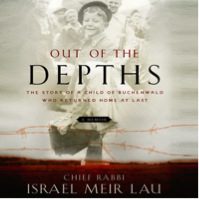
Rabbi Israel Meir Lau’s Out of the Depths
Several years ago, as part of a holiday reading list (it was, like this year, a season filled with three-day holidays), we included Out of the Depths by Rabbi Israel Meir Lau. It’s the memoir of the former chief rabbi of Israel, currently chief rabbi of Tel Aviv, who was one of the youngest survivors of a concentration camp. The memoir naturally divides into three section: the war; Lau’s early years in Israel and the beginning of his professional development; and reflections on his time as chief rabbi.
The life story is written with a beautiful honesty, particularly the first and second “sections.” It’s strange to call it a coming of age story, but that’s what it is. Of course Lau’s struggles are far beyond what most people face, but he recounts them as they occurred, without infusing too much hindsight. It makes for an organically poignant read, for he allows the readers to stand in that child’s shoes, a rare literary feat. Denver Jews were treated to Lau’s moving words when he spoke here earlier this year, and we have no doubt that many in the audience have since read his book, if they hadn’t yet.
There is a vignette in the book that we blogged about after including Out of the Depths in the holiday reading list, just one of so many moving vignettes that Lau’s book is filled with. This particular one relates to the Torah portion of Noah, which is read in synagogues and temples this Saturday.
Following the flood, which wiped out everything apart from whatever was in the ark, Noah becomes a vintner, and “He drank of the wine and became drunk, and he uncovered himself within his tent” (Gen. 9:21). This drunken and inappropriate behavior of Noah’s is often criticized, but Lau shares a powerful interpretation as told to him by Yiddish poet Itzik Manger.
Manger, a Holocaust refugee who suffered from alcoholism, calls himself “Noah after the flood.” Lau recounts visiting an ill and emaciated Manger in the hospital, who tried to reconcile the Torah’s description first of Noah as a tzadik and then later as a drunk.
“How can a tzadik also be a drunk? I always wondered about this, but now I have reached an age and a condition where I understand Noah,” says Manger. He says:
When he went back home [after the flood] and began to look for his hometown, his shtetl — he found nothing. He wanted to visit his neighborhood shtiebel, his study hall, his synagogue, but found no trace…Where was the postman he knew, the wagon driver? No one was left. No house or street, no neighorhood or friends — not a living soul…In order to forget his solitude, he drank of the wine and became drunk (Gen. 9:21).”
Manger begins naming communities and yeshivas in Warsaw, rabbis and family members from there — all gone. Like in Noah’s times, All existence on earth was blotted out (Gen. 7:23). Or so it felt to Manger, who lost his entire family in the Holocaust.
“No one is left,” he says to Lau. “I remained alone in the world. So you will excuse me…if sometimes, in order to forget the horrors, I drink a little.”
It’s an interpretation only a Holocaust survivor would think of.












